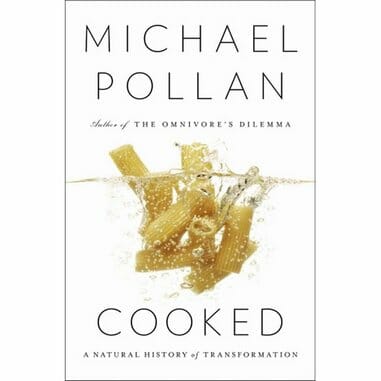Cooked: A Natural History of Transformation by Michael Pollan

Michael Pollan has made a name for himself as an ardent critic of the hyper-engineered ‘notional’ food flooding the marketplace. In Cooked, his latest book, he positions himself to appeal to practically any reader: smart enough for the NPR/TED talk crowd, yet down-to-earth and pragmatic enough to potentially win over the kitchen illiterate. He quotes Coleridge and eats barbecue, criticizes the food industry but still has to contend with it like us mortals. (He also readily admits to eating while driving around in his car, something that makes me personally feel a little better, though only a little better, about the bag of M&M’s in my cup holder.)
At its core, Cooked (with the heady subtitle A Natural History of Transformation) makes only the gentlest of arguments and has little value as a polemic. Even the laziest eater won’t deny that home-cooked food is probably healthier and we should be eating more of it. The only people who might take issue with the main notion of the book (that cooking ranks as the chief act of society) might be raw vegans, whom Pollan dismisses as “faddists.” Rather, he turns the focus on the act of cooking itself, avoiding 400 pages of chastising us for eating out so often. As he asks in his introduction, “Once it has been dismantled, can a culture of everyday cooking … ever be rebuilt?”
The most ingenious thing about this book? Its structural hook, which breaks up the culinary world into four chunks, with each chunk focused on a different stage of civilization, philosophy and classical element (Fire, Water, Air and Earth, in that order). With each element also comes a particular type of food that Pollan tries to prepare for himself – foods in most cases beyond his previous realm of cooking experience (He includes recipes in the back of the book). This gives his chapters their own flavor, so to speak, even as he touches on several recurring themes.
The first of these sections, “Fire,” feels most dynamic, centering around various forms of pit cooking—largely southern barbecue, which Pollan describes with a fervor and admiration that borders on the pornographic. Pork crackling surely has never sounded as absurdly majestic as it does in Pollan’s fatty lines: “[The] skin was gorgeous: lacquered brown, the color of strong tea.”) He meets various inhabitants of North Carolina’s barbecue world, including larger-than-life pitmaster Ed Mitchell. Between helping out with a roast and learning the practice himself, Pollan ponders the masculine mythos of cooking meat over fire, invoking Prometheus, Biblical lore and Freud’s curious theory that society advanced once man learned he could put out fires by urinating on them.
It’s a vastly entertaining section, expertly spanning history and anthropology, while examining the moral and practical issues of cooked meat without denying the simple facts that humans seem to viscerally respond to it, especially its smell. (And it’s not just us: According to a study cited by Pollan, “… given the choice, many animals will opt for cooked food over raw meat.”)
The pace tapers off in “Water,” partly by design as Pollan intentionally turns his gaze to stove-based boiling and braising. Compared to the focused narrative of the previous section, this one meanders. Rather than create a coherent subject matter from our associations with this element, Pollan jumps here and there, trying to tackle gender discrimination in the kitchen and the evolution of modern grocery culture. The timelines track, in Pollan’s view: As food production evolved, “… the industry was only too happy to clothe itself in feminist ideology if that would help it insinuate itself into the kitchen and onto the dinner table.”
Though a fitful, not entirely successful attempt, this section does offer one revelation— the intriguing idea that preparing a frozen dinner really doesn’t save much more time than a homemade one. (“I could make onion soup from scratch in 40 minutes!” Pollan notes…the same amount of time it takes to prepare four different pre-packaged frozen dishes.)
-

-

-

-

-

-

-

-

-

-

-

-

-

-

-

-

-

-

-

-

-

-

-

-

-

-

-

-

-

-

-

-

-

-

-

-

-

-

-

-








































